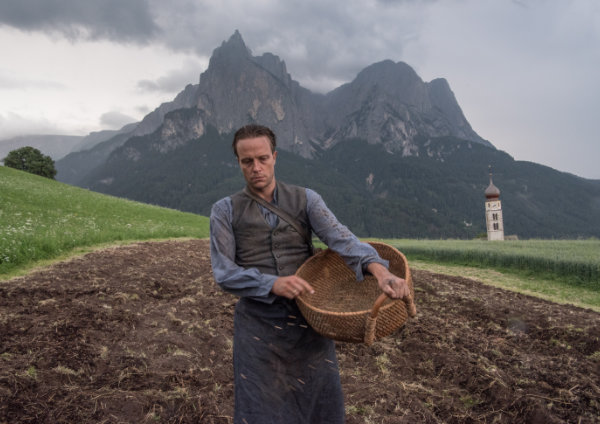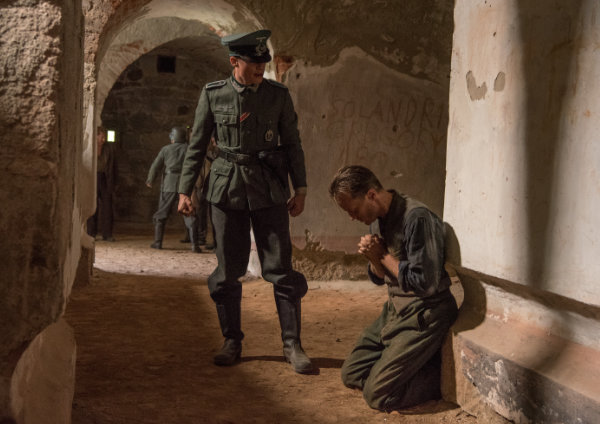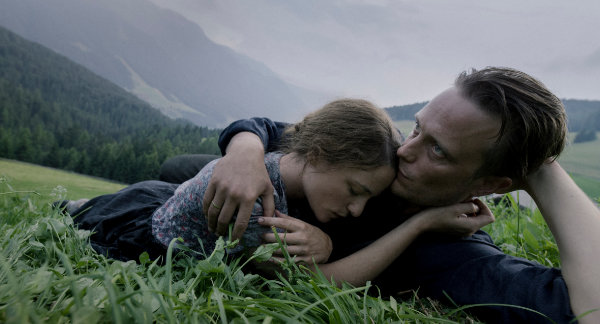In my opinion, the best film of 2019 was barely acknowledged throughout the awards season. A Hidden Life is a magnificent masterpiece from almost any perspective, a biopic of a seemingly very ordinary man and his wife and their tragic but ultimately triumphant decision to take a stand against one of history’s most evil regimes. A Hidden Life is a timely story for our day when following one’s conscience against prevailing sentiment is admired but seems quite rare.
In my Windows to the Soul segment on the Salt + Light Radio Hour last week, I couldn’t restrain my enthusiasm for A Hidden Life: a film made by a brilliant filmmaker about a future saint of the Catholic Church. (Franz Jägerstätter, a peasant Austrian farmer who was executed for refusing to serve in the Nazi army and take an oath to Hitler, was beatified by Pope Benedict XVI as a martyr in 2007.) Rather than offering a detailed commentary here, I will share what I especially loved about A Hidden Life after just one viewing. (I fully intend to watch it again when it releases to streaming/DVD in March. At that point, I hope to make available a Cinema Divina Guide that you can use on your own or perhaps with your family or a group.)
Director/writer Terrence Malick has had a distinguished career as a filmmaker, with his work often described as visual poetry. I am no expert on Malick’s films as I have only seen about half of them. But many people who watch one of his films for the first time have a strong reaction to it—loving it or hating it. His films are always visually impressive, offering depth, raising powerful questions and providing an opportunity for reflection. Despite its length (just 6 minutes short of three hours), A Hidden Life is one of his most accessible recent films, as it follows a linear narrative that cannot help but evoke strong emotion.
A Brave Choice
Exploring the life of an ordinary man who made one extraordinary decision was a courageous choice for filmmaker Terrence Malick. Just one sentence can capture the story of Blessed Franz Jägerstätter: a young Austrian farmer who followed his conscience, refused to serve in the Nazi army, and was executed for it in 1943, leaving behind his wife and young daughters. In the hands of another filmmaker, this could have been a boring, “preachy,” or superficial film. But not here. There’s no preaching. I don’t believe the film even uses the word “conscience” once.
With Franz’s one surprising decision as his focal point, Malick gives us an authentic, compellingly human portrayal of the heartbreak of an ordinary couple committed to following Christ. At the same time, the film unpacks the grand themes of conscience, discernment, family, free will, suffering, and martyrdom (in several forms), but all in a very human, natural way. A Hidden Life has little (if any) cerebral dialogue and no grandstanding shots or speeches. Instead, sparse dialogue, phenomenal acting, and tender scenes of daily life amidst an inexorable buildup of tension enable us to enter into the lives of Franz and Fani and the mystery of what it meant for them to truly follow Christ even to the point of death.

Photo by Rainer Bajo. © 2019 Twentieth Century Fox Film Corporation. All Rights Reserved.
A Contemplative Experience
A Hidden Life is not a spectacle film full of explosions or fights, but it is a spectacular film, with its sweeping vistas of the mountainside that, combined with the scenes of ordinary farm labor and visual details of intimate family moments, immerse us in the Jägerstätter family life. The film heightens the tension by its use of endless contrasts—between light and dark, truth and illusion, the sloped cathedral of nature and the torment of closed prison walls.
Like many of Malick’s films, A Hidden Life is not just visual storytelling, but uses every cinematic element to help us enter into an experience: haunting music, visual beauty, personal details, authentic performances, historical accuracy, tenderly moving letters between husband and wife, and understated but rising narrative tension. That is the greatness of A Hidden Life: as every element of the film helps us enter into the inner drama of Franz and Fani, we are able to share just a bit in the mystery of their Christ-like, heroic choices to love.
The rhythm of the film is contemplative, with some similarities to another great film, Of Gods and Men (the story of the Trappist monks who were martyred in Algeria in 1996.) A Hidden Life has a clear, linear narrative that brings Franz, Fani, and us relentlessly towards an end we might dread but need to see: how could they possibly endure? Each moment of the film—including its exquisite backdrop of skies, mountains, and farm life—is layered with purpose and meaning that deepen our understanding. The skies, the mountain, the farm, the little church, all seem to be characters who witness to the agonizing drama of two ordinary souls being shaped to heroic love.

Photo by Rainer Bajo. © 2019 Twentieth Century Fox Film Corporation. All Rights Reserved.
An Exploration of Christian Discipleship
The portrayal of a deeply loving marriage is one of the strengths of this film—artistically and as a recognition of the spouses of those who make heroic choices. Although Fani and Franz are far from perfect, the film offers a rare screen-model for Catholic marriage. Husband and wife are clearly individuals with normal joys, sufferings, and tensions (Franz’s mother resents Fani and blames her for Franz’s choice). They do not agree on everything but nevertheless, love each other so much that they always choose to support the other. Fani clearly struggles with the consequences of the choice Franz makes, and in the film, Fani’s journey is as important as Franz’s. Franz clearly relies on her strength, understanding, and above all her love, as the inevitability of his martyrdom approaches. Her “martyrdom” is of a different sort, but she fully shares in his suffering as she is left alone, a widow who, isolated and despised by most of the villagers, must work a farm and raise three young daughters.
The sparseness of the dialogue initially builds the tension in the film, as it allows us to imagine the interior sufferings of Franz and Fani. Eventually, though, words become less and less necessary; and the words that are used take on great depth of meaning, as they are excerpts from the letters between the couple. (The letters are available in English in Orbis’ edition of Franz Jägerstätter: Letters and Writings from Prison.)

Photo courtesy of Fox Searchlight Pictures. © 2019 All Rights Reserved.
Sacred Art at Its Most Glorious
A Hidden Life is sacred art at its most glorious, a cinematic masterpiece by a renowned and brilliant filmmaker that takes us on a journey through the details of an ordinary Christian life and beyond: into both the human agony and hope-filled mysticism of the Cross. A Hidden Life is so much more than a movie to watch: it is a powerful experience not to be missed, a journey that takes us deep into some of the most important questions and themes of our time: the dignity of the individual and of free will, the critical importance of following one’s conscience, the gift of discernment, the strength that comes from the love of family, what it means to be faithful to Christ and to one’s loved ones, insights on Christian suffering, and what martyrdom looks like today, in a time when discipleship and living according to our conscience is challenged by the culture in which we live. Over and over again, Franz is badgered with the question, “What difference will your choice make if someone else will just take your place?”
A Hidden Life is an artistic triumph and an impressively authentic biopic of a martyr and his wife who are faithful not just to Christ but to each other. But above all, it is a meditation, a movie for the soul. A Hidden Life is a film not to be missed, an excellent choice to watch especially in these weeks of Lent and Easter.